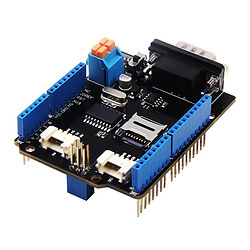Also, it appears CAN-FD frames are not being sent (only CAN 2.0) despite presumably configuring for CAN-FD. Below is a snip of my code.
#include <mcp2518fd_can.h>
#include <mcp2518fd_can_dfs.h>
#include <mcp_can_fd.h>
#include <TimerInterrupt.h>
#include <TimerInterrupt.hpp>
#include <ISR_Timer.h>
#include <ISR_Timer.hpp>
#include <SPI.h>
#define MAX_DATA_SIZE 64
// Full Scale Pressure Range from Dyno
const float FullScalePressure = 231.46;
// pins for CAN-FD Shield
const int SPI_CS_PIN = 9;
const int CAN_INT_PIN = 2;
mcp2518fd CAN(SPI_CS_PIN); // Set CS pin
//Variable Definitions
unsigned int VoltageCounts = 0;
float Voltage = 0;
float Pressure = 0;
unsigned int Pressure16bitScaled = 0;
unsigned int Pressure16bitScaled2 = 0;
uint8_t PressureLowByte = 0;
uint8_t PressureHighByte = 0;
bool KL15 = 0;
bool IgnStat = 0;
uint8_t IgnStatValue = 1;
bool PushButton = 0;
unsigned int VoltageOffset = 0;
unsigned int VoltageCountsZeroed = 0;
unsigned int PreChargeSwitch = 0;
float PreChargeVoltage = 0;
uint8_t PKBSwitchState = 0;
uint8_t PKBApplyReleaseRequest = 5;
bool ApplyReleaseFlag = 0;
uint32_t TimeStamp = 0;
unsigned char flagRecv = 0;
unsigned char len = 0;
unsigned char buf[MAX_DATA_SIZE];
/*
can-fd baud rate:
CAN_125K_500K
CAN_250K_500K
CAN_250K_750K
CAN_250K_1M
CAN_250K_1M5
CAN_250K_2M
CAN_250K_3M
CAN_250K_4M
CAN_500K_1M
CAN_500K_2M
CAN_500K_3M
CAN_500K_4M
CAN_1000K_4M
CAN_1000K_1M
CAN20_250KBPS
*/
void setup() {
Serial.begin(115200);
//while(!Serial){};
//CAN.setMode(CAN_NORMAL_MODE);
while (CAN_OK != CAN.begin(CAN_1000K_1M)) { // init can bus : baudrate = 1000K_1M
Serial.println("CAN init fail, retry...");
delay(100);
}
Serial.println("CAN init ok!");
//Setup Interrupts
//attachInterrupt(digitalPinToInterrupt(18), ApplyRelease, CHANGE);
pinMode(22, INPUT_PULLUP);
pinMode(23, INPUT_PULLUP);
pinMode(24, INPUT_PULLUP);
}
void loop() {
// Read KL15 input switch, if TRUE then enter while loop below.
KL15 = digitalRead(22);
if (KL15 == 0){
VoltageOffset = analogRead(A0);
}
while(KL15 == 0){
// Read Pressure Transmitter Voltage and Zero
VoltageCounts = analogRead(A0);
VoltageCountsZeroed = VoltageCounts - VoltageOffset;
// Calculate PreChargeSwitch Voltage
PreChargeSwitch = analogRead(A1);
PreChargeVoltage = PreChargeSwitch*5.0/1023;
//Check if Zeroed Voltage Count is OOR (negative) and set to 0 if negative. This prevents the voltage counts from wrapping around.
if (VoltageCountsZeroed > 1024) {
VoltageCountsZeroed = 0;
}
// Calculate Voltage and Pressure from Zeroed Voltage Counts Value
Voltage = VoltageCountsZeroed*5.0/1023;
Pressure = (Voltage)*FullScalePressure/5;
//Precharge determination logic, if Pressure > bar then set 16 bit pressure output to analog pressure input
if (Pressure > 5){
Pressure16bitScaled = Pressure*51200/200;
}
// If precharge switch is activated then set pressure output to 4 bar
else if (PreChargeVoltage > 4.5){
Pressure16bitScaled = 1024; //Corresponds to 4 bar pressure
}
// Otherwise set pressure output to 0
else {
Pressure16bitScaled = 0;
}
/* This causes PKBApplyReleaseRequest to set to 27.
if ((ApplyReleaseFlag == 1) && ((millis() - TimeStamp) < 200)){
PKBApplyReleaseRequest = 27;
}
else{
PKBApplyReleaseRequest = 5;
}
// This causes PKBApplyReleaseRequest to set to 40. Once 200 ms elapses the request set to 5.
if ((ApplyReleaseFlag == 0) && ((millis() - TimeStamp) < 200)){
PKBApplyReleaseRequest = 40;
}
else{
PKBApplyReleaseRequest = 5;
}*/
//Split 16 bit value into lower and upper bytes to be sent over CAN.
PressureLowByte = (byte) (Pressure16bitScaled & 0x00FF);
PressureHighByte = (byte) ((Pressure16bitScaled & 0xFF00) >> 8);
//Read IGN Status signal
IgnStat = digitalRead(23);
//Setting eBooster_CMD
uint8_t eBooster_CMD[7] = {PressureLowByte, PressureHighByte,5,5,5,5,5};
//Setting eBooster_Veh_Pwr
if(IgnStat == 0){
IgnStatValue = 4; //sets IgnCmdStat to RUN
}
else{
IgnStatValue = 1; //sets IgnCmdStat to OFF
}
uint8_t eBooster_Veh_Pwr[2] = {IgnStatValue, 120};
uint8_t eBooster_Veh_Data[2] = {0, 0};
uint8_t eBooster_1[2] = {0, 0};
uint8_t eBooster_2[1] = {0};
uint8_t eBooster_3[8] = {0, 0, 0, 0, 0, 0, 0, 0};
uint8_t eBooster_4[2] = {0, 0};
//Sending eBooster_CMD
CAN.sendMsgBuf(0x07, 0, 7, eBooster_CMD); // send a standard frame to id 0x07
//Sending eBooster_Veh_Pwr
CAN.sendMsgBuf(0x112, 0, 2, eBooster_Veh_Pwr); // send a standard frame to id 0x112
//Sending eBooster_Veh_Data
CAN.sendMsgBuf(0x113, 0, 2, eBooster_Veh_Data);
//Sending eBooster_1
CAN.sendMsgBuf(0x14B, 0, 2, eBooster_1);
//Sending eBooster_2
CAN.sendMsgBuf(0x14C, 0, 2, eBooster_2);
//Sending eBooster_3
CAN.sendMsgBuf(0x158, 0, 2, eBooster_3);
//Sending eBooster_4
CAN.sendMsgBuf(0x11C, 0, 2, eBooster_4);
if (CAN_MSGAVAIL == CAN.checkReceive()) {
CAN.readMsgBuf(&len, buf); // You should call readMsgBuff before getCanId
unsigned long id = CAN.getCanId();
Serial.print("Get Data From id: ");
Serial.println(id);
Serial.print("Len = ");
Serial.println(len);
// print the data
for (int i = 0; i < len; i++) {
Serial.print(buf[i]);
Serial.print("\t");
}
Serial.println();
}
delay(1); // send data once every 1 ms
//Read KL15 at end of while loop
KL15 = digitalRead(22);
Serial.println("IgnStat");
Serial.println(IgnStat);
Serial.println("IgnStatValue");
Serial.println(IgnStatValue);
}
}
/*
//ApplyRelease request ISR
void ApplyRelease ()
{
ApplyReleaseFlag = !ApplyReleaseFlag;
TimeStamp = millis();
}
*/
// END FILE
